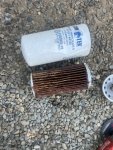you might find you will want to lower the waste oil density with some diesel before running it through the finest final filter .. Will help with flow of course and the low-micron final filter will reduce metal particles as you may know .. Microscopic metal can raise havoc with the IP and injectors in due time, and I sure know of one large regional carrier that ran waste mixes in it's old Mack's from the 1950's- 1980's before it shut down.. The owner said replacing injectors and rebuilding the occasional IP was worth the fuel saved.. And I can tell you his trucks were impressive smoke shows leaving the yard..
I don't run wmo, but i have run wvo for almost 20 years in everything that spends at least 2hrs continuous runtime throughout a day and does not sit for long periods of time .. Well, nowadays that narrows it down to one dozer, an excavator, and maybe 1 or 2 trucks

... Each has a separate tank for diesel and the wvo mix "just in case" they wind up sitting , and of course run on diesel for several minutes before shutdown.. No such thing as filter overkill when it comes to wmo/watf , and a centrifuge will help you best to remove water and/or AF in your oil, although I myself don't have one.. If your truck's FDC is bypassed or you are running waste in commercial equip, you have to be mindful of the "specific gravity" (density, thickness etc) of your fuel ... A simple hydrometer is used for that , and your "specific gravity" also varies with temperature .. Way back when I started, i was using a wvo/kero/diesel mix and going "by eye" as to density.. Worked fine until colder mornings rolled in, upon which the IP seals on some of the trucks and equip started to leak , my fuel mix was too "heavy" for the cold mornings until the outside temp rose and as the fuel warmed up .. After my earlier lessons learned, my mix is more "scientific" and improved , and I don't run the waste if the ambient temp of the fuel is below 60F .. As they say, "your results may vary"




